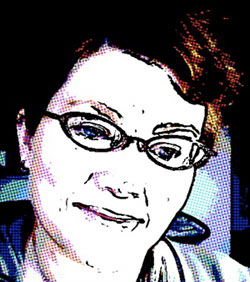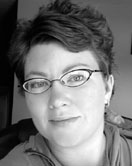












 |
|||||
|
Find information about submitting your own widow story or to contribute to WidowSpeak in other ways. Print this story Download a PDF version to print Poetry Storybank |
|||||
| Fierce Look into the Future | |||||
by Amanda Shaffer |
page 1 | ||||
| DATE: 10/30/06 | ORIGIN: NORTH AMERICA / US | |||||
|
That’s right, you read that correctly. I will find a way to realize my goals whether I am welcomed to this school or not. Let me explain by sharing how I arrived at this point. At twenty-six years old, I have a job that has afforded me the opportunity to travel to many new and exciting places. I get paid very well for my career field and level of experience. My current employer even paid for all of my undergraduate student loans as a perk for committing to the company for three years. And I am about to throw it all away to pursue a job in a career field that I had never previously considered before February 19, 2005. On that day, my new husband and significant other of nine years, Eric W. Shaffer, was diagnosed with a relapse of Acute Lymphocytic Leukemia. This was his second experience with the disease; however, assuming the role of his sole caregiver was a new one for me. We had been married for nine months. Eric was twenty-three, and I was twenty-four. Cancer is a terrible disease for anyone it touches. As a newlywed young couple, we quickly found that there are few other diseases that devastate the afflicted so thoroughly. For those patients who are lucky enough to beat cancer, overcoming the physical disease is just the beginning as they then face co-pays for months and months of medical care, prejudice in finding new employment post-treatment, and the lingering secondary effects of harsh but necessary treatments. Eric and I also learned that the devastating effects of cancer are compounded greatly when young adults are affected. Due to the limited career choices that I had after receiving a B.S. in Developmental Psychology, I accepted a government internship on the island of Oahu, Hawaii. Five thousand miles away from our families when he was diagnosed, Eric and I were forced to end the honeymoon early and negotiate a confusing system of specialists, referrals, and prescription-drug benefits. While learning to clean Eric’s chemotherapy catheter and giving him growth-factor injections, we often had to deal with being treated differently by the hospital staff as the youngest adult patients on the floor. Eric and I had good health insurance through my job, but were still hit with $300-$400 co-pays each month that were a struggle to pay with my entry-level salary. When we went to our local Social Security Office to apply for disability, Eric was immediately turned down for all benefits when it was determined that he hadn’t worked enough to accumulate the necessary forty S.S. work credits. (When we asked the representative how Eric was supposed to have worked enough to obtain the credits while having cancer twice since 1999, just graduating from college, and only being 23 years old at the time of application, the answer was, “I’m sorry that there is no policy to address your concerns…please write your Congressman.”) When the news came that we would need to go back to the mainland for a bone marrow transplant, the stress of getting our few possessions, our cat, and ourselves to Maryland was added to the mix. The pressure of performing at my job, acting as a caregiver and advocate for my husband, making arrangements for the move, finding a new job in the vicinity of Johns Hopkins hospital, keeping our family members and friends posted on Eric’s condition, and caring for household duties took its toll on me. I struggled to do it all and felt that I was succeeding at nothing. However, in meeting other 20- and 30-something cancer patients, I realized that Eric and I were luckier than most. We hadn’t fallen into the gap that many people our age experience. One of us had gotten a job with a full benefits package immediately after college. Young adults just out of college are the most likely to be uninsured or underinsured-too old for their parents’ plans and not established in careers with full benefits. Also, our health insurance was willing to pay for Eric’s bone marrow transplant, no questions asked. Many leukemia and sarcoma patients have their claims denied after cutting-edge treatment that may prove to be life-saving is deemed “experimental.” Despite this supposed “luck,” Eric and I relied on charity at times for assistance with paying our co-pays, prescriptions, and medical equipment expenses not covered by insurance. While Eric and I were thankful for the breaks we got during our journey with leukemia, the added difficulties of being a cancer patient in early adulthood had resulted in an overall disheartening experience, leaving a bitter taste in our mouths about the condition of health care in the United States. Additionally, we were not able to figure out what Eric would have told potential employers about the significant amount of time after college when he wasn’t working. While employers are not legally permitted to ask specific questions about an applicant’s health during an interview, we feared that Eric’s leukemia would have had a negative impact on his career and professional opportunities for the rest of his life. My husband and I were dealt a final, crushing blow when we received the news that we would not be able to have children together due to side effects from his years of chemotherapy. A pre-marrow-transplant fertility test in July 2005 confirmed that, at the ages of 24 and 25, we would never have the opportunity to have our own children. Eric’s initial leukemia treatment, in 1999, was at a pediatric hospital that did not explain options for preserving one’s fertility to its young patients. However, the burdens of employment and lost fatherhood are no longer of concern to Eric. Eric W. Shaffer, my husband, partner, and best friend, passed away on March 17, 2006 from complications caused by his chemotherapy treatment. He left behind his mother and father, a twenty-five year old widow, and hundreds of friends, family members, and acquaintances whom he touched and inspired simply by staying real and fighting until the end. Six months after my early entry into the world of widowhood, I am still finding it to be a strange and bewildering place. Being a twenty-something widow is very similar to being a young adult long-term illness patient: there are few to no resources available that address the specific needs of the population. The general public does not know how to react to a twenty-six year old in my situation; I have experienced avoidance, platitudes, and downright ignorance when I choose to share that “no, I’m not single, I’m a widow.” As I make my way through this dark time, the urge to hide my status from the world and avoid the pitying looks, the prying questions and the well-meant, but misguided remarks grows stronger and stronger. But sometimes, a seemingly harmless object or event will trigger a string of memories to go off like firecrackers inside my head, and the grief spills out into my public and professional lives. Try as one might, it is damn near impossible to portray to the world that everything is fine while one is still deep in the throes of grief and healing. While I have publicly displayed my grief, I’ve also found that it is absolutely necessary to remember the person who passed away in terms of the positive contributions he or she had on other people’s lives. And for that reason, I have chosen to soldier onward and live to honor Eric’s life, instead of perpetually mourning his death. I am becoming a Medical Social Worker. In this vocation, I hope to make the world a friendlier place for cancer patients and young adults whom are dealing with long-term illnesses, end-of-life planning, and related issues. In honor of my late husband, the love of my life, and young adult cancer patients and widow(er)s everywhere, I REFUSE to let my grief control me. I am mad as hell that there are few resources for twenty-somethings faced with serious illness and death. It isn’t fair that public, charitable, and corporate spending for cancer research is not distributed equitably—breast cancer, a highly treatable cancer that is not even the leading cancer killer of women, received the lion’s share of both research and patient support funding. My goal is to challenge the treatment and resource inequities until I can be confident in the knowledge that no other young adult patients will have to endure an experience similar to ours. To achieve this ideal, I am currently working on two separate fundraising campaigns in memory of Eric. I’m also working on developing materials on grieving, written specifically for young widows. To further awareness of treatment and funding inequities, I write for several websites, including an appearance as a featured author on The Huffington Post (huffingtonpost.com). And I plan to shout and write and scream until research and patient support funding is more equally distributed, young adult patients of long-term illnesses have more of a support system, and young widows no longer feel like they have to hide their marital status for the sake of others’ emotional comfort. It is for Eric that I am changing my profession, my goals, and my life. It is for Eric that I hold onto my dream of kicking cancer’s ass. And so, I will become a medical social worker. My determination is fierce and I have a motivator that is heart-breaking, infuriating, and inspiring. I will find a way to achieve this goal even if it means applying to every MSW program in the country. Will you help me in my quest?
Contributor Amanda Shaffer has written and lived the experience of cancer for several years. She received a B.S. in Developmental Psychology from the University of Pittsburgh, and is currently in the process of pursuing her Masters of Social Work. Amanda has overseen youth development programs in various contexts and locales, from teaching literacy to prison-bound teens to directing social programs for military youth. After the loss of her husband to leukemia, she’s studying to become a medical social worker. She chronicled her husband’s bone marrow transplant at cancer, it’s not just an astrological sign anymore, and currently writes at The Cat Lady. and BlogHer. View all of Amanda's WidowSpeak Blog posts.
|
|||||
| Comments or inquiries about this story? annmarie@widow-speak.org or 707-824-8030 |
|||||
| page 1 | |||||

 I
do not need to be admitted to this University.
I
do not need to be admitted to this University. Amanda
Shaffer , Blogger. Caregiver. Graduate Student. Widow.
Amanda
Shaffer , Blogger. Caregiver. Graduate Student. Widow.